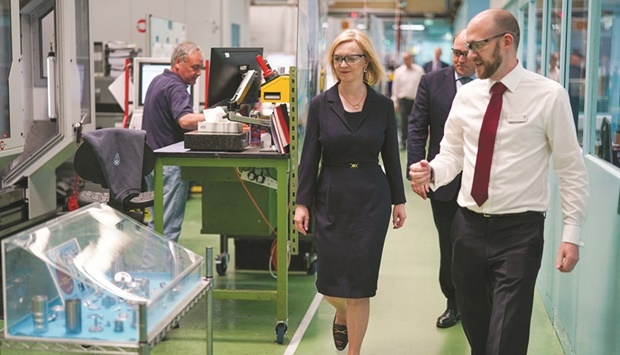Liz Truss, the frontrunner to be Britain’s next prime minister, stuck to her plan to cut taxes to help households cope with a looming 230% leap in energy prices, despite warnings that lower taxes won’t help those facing increased poverty and destitution.
The Bank of England warned last week that Britain was on course for a long recession as unprecedented energy prices push inflation towards 13%, but any political response has been hampered by the race to select a new prime minister on September 5. While European governments seek to conserve gas usage and increase storage following Russia’s invasion of Ukraine, Britain’s government has split into warring camps led by Truss and rival Rishi Sunak who have clashed over how to respond.
A spokesman for outgoing leader Boris Johnson said it was not his place to intervene.
He remains prime minister until September 5, but has only recently returned from holiday.
Foreign Secretary Truss was asked five times by a reporter in a TV interview if she would provide financial support to households who cannot afford to pay the £4,266 annual bill that is forecast to hit in January, up from £1,277 earlier this year.
She said her priority was to cut taxes, rather than funnelling cash back to households via energy support.
“What I’m promising is from day one, people will have lower taxes,” she said, adding she would also halt green levies, which would reduce energy bills by less than 8%. Her critics say tax cuts would benefit the wealthy over the hardest hit.
Truss’s response sparked criticism on the day that forecasting group Cornwall Insight raised its energy price estimates. Cornwall now expects the cap on a typical household energy contract to rise by 82% in October, adding to the 54% rise that came into force in April.
It will take average annual bills for gas and electricity to £3,582, driven by soaring wholesale costs and changes in the way the cap is set.
The cap is then expected to rise to £4,266 in January, compared with Cornwall’s previous forecast of £3,616.
A move by Russia to cut gas exports to the West has driven up bills across Europe, forcing governments in Italy, France and elsewhere to intervene to protect their citizens. In Germany bills have nearly trebled in a year, while France has capped electricity tariff rises at 4%.
Sunak, Britain’s former finance minister, previously announced a £37bn package of measures to try to ease the cost of living crisis this winter, including a £400 credit on energy bills for every household.
Since then wholesale gas prices have more than doubled.
Campaign group End Fuel Poverty Coalition said around a third of households, or 10.5mn, could be classed as being in fuel poverty by January, limiting their ability to spend on anything but fuel, food and others bills. Ed Miliband, energy spokesman for the opposition Labour Party, described the Cornwall forecast increase as “catastrophic”, while vocal consumer campaigner Martin Lewis urged the “zombie” government to wake up, saying: “This will leave many destitute.”

Britain’s Conservative Party leadership candidate Liz Truss visits the Reliance Precision engineering company ahead of a hustings event later, in Huddersfield, Britain, yesterday.
